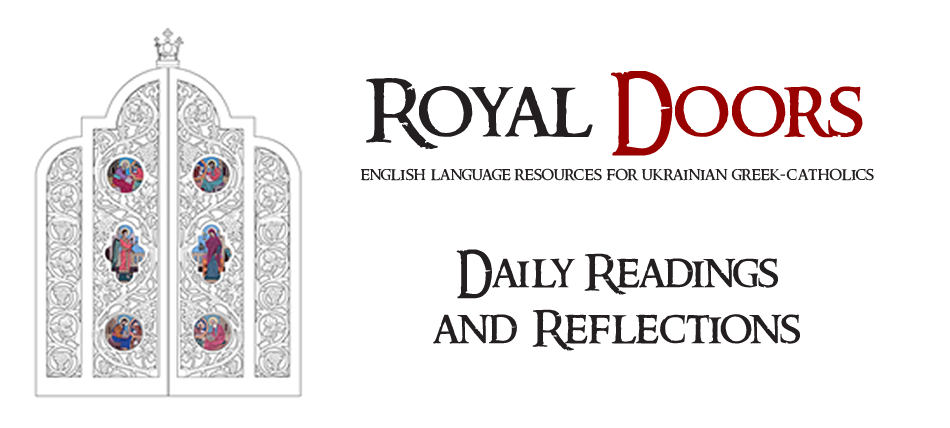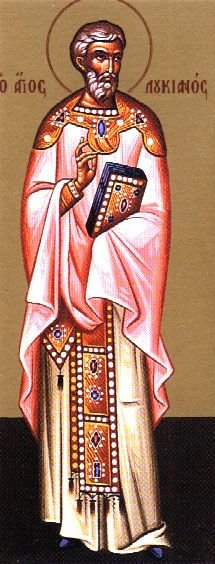MOST CHRISTIANS KNOW that the books of the New Testament — the Gospels, the Epistles and the rest — were written in the first century ad. Some know that these books were compiled as the New Testament sometime in the next three centuries. Few know that the form of the New Testament which we use in our Church — the “Byzantine text” — is largely the work of St Lucian of Antioch, whom our Church remembers on October 15.
Who Was Lucian of Antioch?
Born in c. 240, Lucian was the son of Christian parents in a Syriac-speaking area in eastern Syria. Some say his hometown was Samosata (now Samsat, Turkey). His family was probably not poor as Lucian was educated in Edessa, tutored by Macarios the Confessor.
Early in life Lucian moved Antioch, Syria’s principal city, where Paul of Samosata was then the bishop. Lucian was ordained a presbyter and attached to the Antiochian Church’s theological school where he soon became its leading figure.
Lucian’s patron, Paul of Samosata, was a controversial figure who divided the Church at Antioch for a number of years. It seems that Paul, of humble origins, was ambitious and somewhat worldly. He took on a civil post in addition to being bishop of Antioch and was accused of spending more energy on his secular post than on serving the Church. The fourth-century historian Eusebius of Caesarea claimed that Paul conducted himself “more like a rhetorician or a mountebank than of a bishop.”
Paul’s love for luxury was not his most serious failure in the eyes of his peers. His critics also accused him of such serious theological errors that the bishops of the province deposed him at a local council in 269, less than ten years after his election. He was accused of teaching that Christ was of purely human origin and that He was Son of God by grace, not by nature. The bishops elected a certain Dominus to succeed him.
Paul had acquired a degree of power, however, and he did not accept their deposition. The Church of Antioch was divided between the supporters of Paul and those who accepted Dominus as the legitimate bishop. Paul remained in possession of the see until 272 when the Emperor Aurelian intervened in the interests of good order and recognized Paul’s deposition.
Many of Paul’s followers, including Lucian, continued to reject the authority of Dominus and his successors. His scholarship and deep piety were never in question and his work was widely received. Finally, in about 285, Lucian was reconciled with the current bishop, Cyril, the third successor of Paul.
The School of Antioch
St Lucian is credited with being an important proponent of biblical interpretation in the tradition known as the “School of Antioch.” While in the main center of biblical study, Alexandria, allegorical interpretation of the Scriptures was promoted, Antiochian writers stressed a more literal interpretation of sacred texts. They also employed typology to root later texts in continuity with earlier revelation. This style would come to dominate biblical study until the modern age. Fourth-century proponents of this school included Diodoros of Tarsus, John Chrysostom and Theodore of Mopsuestia.
The Antiochians also emphasized the distinction between the human and divine in the person of Christ while the Alexandrians stressed the union of the human and divine in Him. In the following century extremes of these views would be described as Nestorian (Antioch) or as Monophysite (Alexandria) and become the defining positions of the Church of the East and the Oriental Orthodox Churches respectively.
Lucian’s Bible
Both Old Testament and New Testament studies occupied most of Lucian’s career in Antioch. Proficient in Hebrew as well as Greek, Lucian produced an edition of the Septuagint in which he used the Hebrew text to correct copyists’ errors and other mistakes which had crept in over the centuries. His version was highly esteemed by St Jerome, the greatest Latin biblical authority of the age. It became the preferred text used in the Antiochian and Byzantine Churches.
Lucian also produced an edition of the (Greek) New Testament which came to be known as the “Byzantine text” used liturgically throughout the Greek-speaking Churches of the East. Centuries later it would be at the basis of the edition made by the sixteenth-century Dutch scholar, Desiderius Erasmus. This version was generally accepted in the West as the “received text,” and used as the basis for many modern translations.
Lucian the Martyr
The greatest and last Roman persecution of Christians began in the year 303 under the Emperor Diocletian. Lucian was arrested in Antioch and transported to the imperial city of Nicomedia, where the emperors often held court. Eusebius recorded that, “…in the presence of the emperor, he proclaimed the heavenly kingdom of Christ, first in an oral defense, and afterwards by deeds as well” (Ecclesiastical History, 13, 2).
Lucian was imprisoned for nine years, during which he encouraged the other Christians with him to remain steadfast in their confession of Christ. He suffered both torture and starvation, because he refused the only food given to him, meat that had been offered to Roman idols.
The fourth-century history by Philostorgios of Cappadocia relates that, when bound and chained down on his back in prison, Lucian consecrated the divine mysteries upon his own breast, and communicated the faithful that were present.
Lucian died on January 7, 312, towards the end of the last great persecution of Christians by Roman authorities. His body was taken to Drepanum (later renamed Helenopolis by Constantine in memory of his mother) and was immediately revered by the Church of Antioch and elsewhere. In a homily preached on his feastday in 387 St John Chrysostom urged Christians to follow his example: “He scorned hunger. Let us also scorn luxury and destroy the lordship of the stomach; that we may, when the time comes for us to meet such torture, be prepared beforehand, by the help of a lesser ascesis, to show ourselves worthy of glory in the hour of battle.”
St Lucian of Antioch is celebrated in the West on the day of his death, January 7. When the feast of the Theophany was extended in the Eastern Churches by the commemoration of St John the Baptist on that day his feast was moved to October 15.
Vesper Hymns to This Holy Martyr
You made the faithful steadfast, enriching them by your faith and the discourse of knowledge of God, so that they might boldly endure the rage of the tyrant for the sake of the incorruptible life which is to come. Wherefore, we call you blessed, O right glorious Lucian, and we celebrate your divine solemnity today.
Lengthy imprisonment and a most violent death did you endure, O venerable one, bound with bonds, lacerated with sharp-edged shards, O blessed one, weakened by cruel starvation and by long thirst. Wherefore, you manifestly received heavenly food becoming an invincible martyr, O valiant athlete.
Source: Eparchy of Newton

